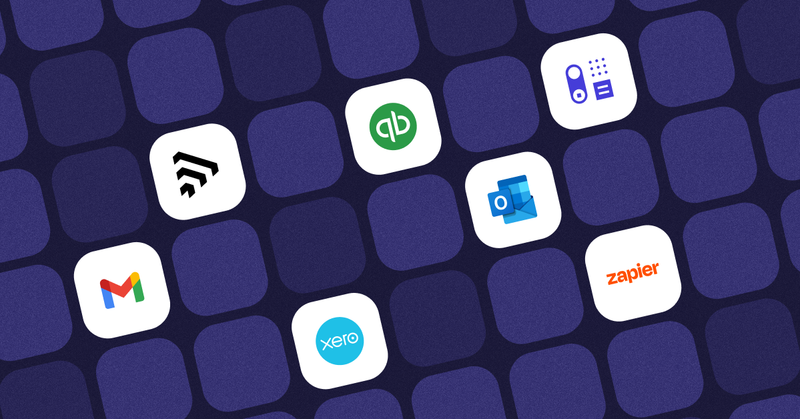What if your CRM is slowing you down instead of helping you grow?
Keap CRM offers a lot, from sales automation to email marketing, but it’s not always the perfect fit for everyone. High pricing, complex setup, and a steep learning curve can sometimes make it feel like more of a burden than a benefit.
If you're stuck in this situation, you should consider a simpler, more affordable solution that matches your business needs without the hassle.
Here are the top 10 alternatives to Keap CRM that can help you streamline your processes without the headaches.
What is Keap CRM?
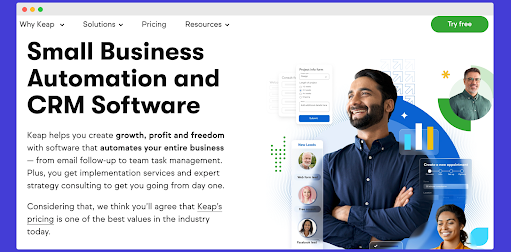
Keap CRM (formerly InfusionSoft) is a tool designed to help small businesses manage sales and marketing in one place.
What sets it apart is its focus on providing a one-stop shop for all your business needs. It combines features like CRM, email marketing, invoicing, and even e-commerce tools, giving businesses everything they need in one system.
With built-in landing pages, payment options, and SMS marketing, Keap makes handling business operations much easier.
Keep CRM key features
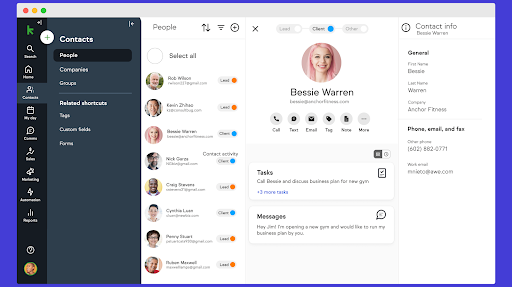
- Keap keeps all your customer details and interactions in one place for easier tracking of appointments and conversations
- You can visually manage your entire sales process with its sales pipeline feature, which helps you keep deals moving smoothly
- It automates repetitive tasks like sending follow-up email campaigns, so you can focus on more important tasks
- Gathering leads is simple with its forms and landing page builder. You can create and connect multiple landing pages into a sales funnel together for optimal results
- You can also assess the leads' probability to convert through Keap's lead score system
- Keap handles your invoicing and payments, all from within the platform, without the need for any additional tools
- With built-in email and text marketing, you can set up campaigns that keep customers engaged
- Scheduling appointments is straightforward, with automatic follow-ups and calendar syncing to keep you organized
- It gives you useful data insights into customer behavior and sales performance through easy-to-read reports
- Finally, Keap gives you the opportunity to set up your own phone line where your customers can call.
Keap CRM pricing

Keap's pricing starts at $299/month and includes all CRM, sales, and marketing automation functionalities without limiting access based on features. However, you will only get 1,500 contacts with this plan.
To get more, you need to upgrade:
- 2,500 contacts – $335/mo
- 4,000 contacts – $383/mo
- 6,500 contacts – $449/mo
- 11,500 contacts – $539/mo
- 16,500 contacts – $629/mo
- 26,500 contacts – $719/mo
- 50,000+ contacts – custom
For a successful implementation, you also need implementation services, which comprise of strategy consulting, data import, and migration. These costs range from $1,500 to $3,500 as a one-time payment, but you get benefits (monthly and quarterly strategy calls) for up to 12 months.
You can add more users for $39/month each, and text marketing tiers start at an additional monthly fee of $24 for higher volumes.
Why you should consider alternatives to Keap CRM
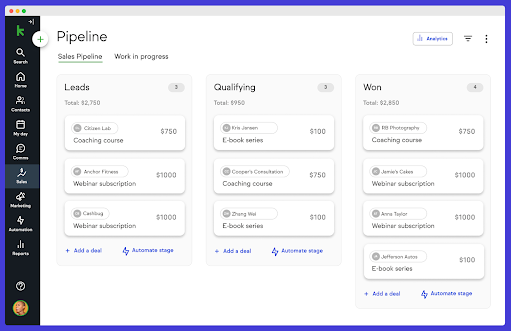
The Keap Platform has a wide range of features for many use cases, but for small businesses, there can be challenges. Here’s an overview of why you may consider other options:
Here’s why you might want to consider other options.
- Steep learning curve—while you can figure it out eventually, it’s not easy to grasp, especially for the less tech-savvy. G2
- The price tag is higher compared to similar tools that deliver almost the same features, especially for marketing tasks. Also, Keap's contact limits are not that great for what you're paying. For instance, with Capsule, you get 30,000 contacts for just $18 per month.
- Customer support is hit or miss—sometimes great, other times you'll be left waiting with no response. G2
- There are issues with functionality, like creating manual invoices that involve both products and subscriptions, or recurring payment methods not being applied automatically. G2
- The platform feels bloated, with too many features that aren’t well-integrated or useful for most businesses. G2
- Doesn't have as much customization as you'd like, such as branding. More customization is locked behind the pricier plans. G2
- The user interface is outdated, and the mobile app is full of long-standing problems, not to mention the clunky email and landing page tools. G2
- Reporting options are limited, and some core features, like deal tracking and filtering, are lacking. G2
- Too much focus on training, but the actual usability doesn’t reflect it, leaving many users confused or overwhelmed. G2
So, while Keap has potential, its downsides can outweigh the benefits for many.
If you want a CRM that’s less complicated, easier to implement and more reliable, you should consider other options.
Maybe you need a more budget-friendly solution or specific features Keap doesn’t get right.
Whatever your situation, there are plenty of other CRM platforms to explore. Let's take a look at 10 alternatives to Keap that could be exactly what you need for your business.
#1 - Capsule CRM: the ultimate CRM for small businesses
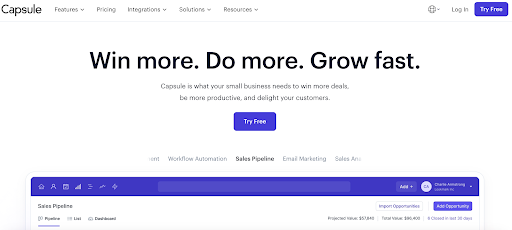
Capsule CRM is a simple, user-friendly platform made for businesses and sales teams that want to manage contacts and track their sales pipelines without the hassle.
It’s perfect for every small business that needs a CRM that’s straightforward yet customizable. Capsule CRM lets you stay on top of customer relationships and sales campaigns without overwhelming features.
Capsule CRM key features
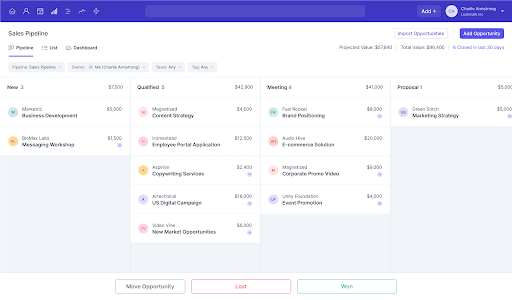
- Contact and lead management: Easily organize and maintain an accurate contact information
- Sales pipeline: Create customized sales pipelines and track deals across multiple stages. Understand overall deal status at a glance in an easy-to-use dashboard
- Stay on task with Projects: Create project plans and key milestones with Tracks. Assign tasks to your colleagues and deliver projects on time—within budget.
- Unparalleled customization: Adjust fields, tags, and dashboards to suit your needs.
- Reporting and analytics: Get detailed reports on business performance.
- Email integration: Seamlessly connects with platforms like Gmail and Transpond for easy communication and email marketing campaigns.
- Mobile CRM: Access your data and tasks on the go with the mobile app.
- Data security: SOC 2 Type II accreditation ensures your data is secure.
- App integrations: Works with popular apps like G Suite, Mailchimp, and Xero for invoicing and payment processing
- Workflow and sales automation: Implement automated tasks like follow-ups and updates to save time. Use Zapier integration to set up advanced automations.
Here’s why you should switch to Capsule CRM
Capsule CRM stands out for being simple to use while giving you all the important tools to manage your business. Here’s how it stacks up against Keap:
- Easy to use: Unlike Keap’s steep learning curve, Capsule CRM is straightforward and beginner-friendly
- Faster setup: You can get started quickly without spending too much time onboarding
- Customization: While Keap can be rigid, Capsule CRM lets you mold the CRM to fit your specific needs.
- Less overwhelming: Capsule CRM focuses on core features that matter without overwhelming you with extras you might not need.
- More cost-effective: Capsule CRM offers plans tailored for small businesses that pack all the features you need at an affordable price. For instance, Capsule's starter plan lands you 30,000 contacts compared to Keap's 1,500.
Capsule CRM pricing
Capsule CRM’s free plan is perfect for small teams, allowing up to two users and managing up to 250 contacts.
For those who need more features, the Starter plan is an affordable option at $21 per user per month, supporting up to 30,000 contacts.
The Growth plan, priced at $38 per user per month, increases the limit to 60,000 contacts and includes advanced reporting tools.
Businesses with larger needs can opt for the Advanced plan, which accommodates up to 120,000 contacts for $60 per user per month, or the Ultimate plan, which supports up to 240,000 contacts at $75 per user per month.
Capsule is ideal for businesses looking for a simple but powerful CRM that doesn’t get in the way. With it, building campaigns and managing contactcs has never been easier.
Explore Capsule CRM's full feature set yourself.
#2 - Nutshell CRM
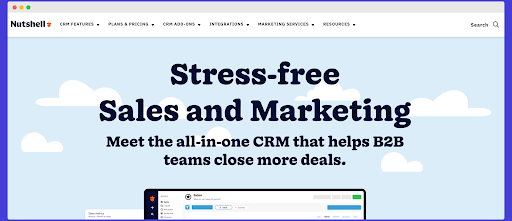
Nutshell CRM is an all-in-one platform for small and mid-sized sales teams that combines CRM, email marketing, and contact management.
It’s user-friendly and helps businesses keep their sales process organized, but it has a few drawbacks. The platform is useful for automating simple tasks like assigning leads and managing customer details.
Still, it falls short in terms of customization and social media integration, which might not work for businesses with more advanced needs.
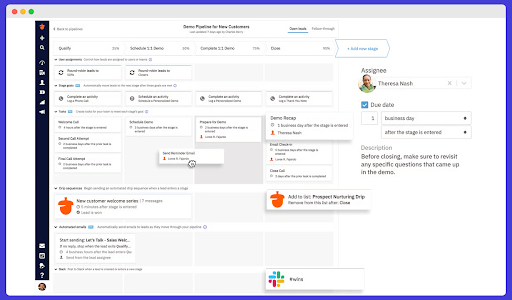
Nutshell CRM key features
- Contact management
- Sales pipeline tracking
- Sales automation
- Email marketing
- Customizable reporting
- Integrations with G Suite, Mailchimp, and others
Nutshell CRM pros
- Intuitive interface that’s easy to pick up.
- Clear visual pipeline for tracking deals.
- Automates repetitive tasks, saving time.
- Integrates well with popular business apps.
- Helpful customer support.
Nutshell CRM cons
- Lacks deeper customization options. G2
- May struggle to grow with larger businesses. G2
- No free version after the 14-day trial.
- Weak social media integration, which can be limiting. G2
Nutshell CRM pricing
Plans start at $16 per user per month, with the Pro plan priced at $42 per user per month. A 14-day free trial is available.
Nutshell is a solid tool, but its limitations, especially around customization, could lead you to consider alternatives, based on your business needs.
#3 - Copper CRM
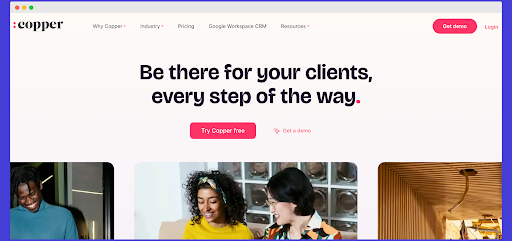
Copper CRM is built for businesses that use the Google Workspace ecosystem.
It integrates smoothly with Gmail and Google Calendar, making customer management and tracking sales leads easier for teams already using these tools. While Copper helps with task automation and workflow management, it’s not without its downsides.
The basic features are ok, but more powerful tools – like advanced reporting – are only available in higher-priced plans, which might not fit all budgets.
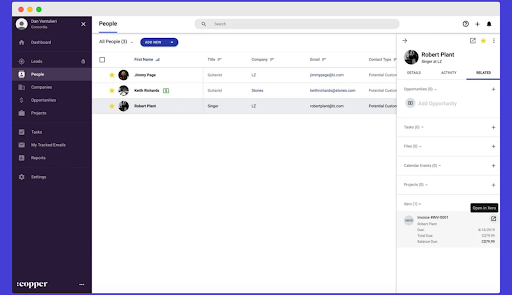
Copper CRM key features
- Google Workspace integration
- Sales reporting and analytics
- Workflow automation
- Task management
- Broad application integrations
- Customizable team permissions
Copper CRM pros
- Great for businesses using Google tools, with seamless integration
- Automates workflows, reducing repetitive tasks
- Task management keeps everything organized
- Strong integration options with third-party apps
- Easy to set permissions for team members.
Copper CRM cons
- Expensive compared to other CRM tools, especially for small businesses. G2
- Reporting features could be more extensive. G2
- Lacks native integration with a CPQ tool. G2
- Users note that basic features are missing from the CRM. G2
Copper CRM pricing
Plans start at $12 per user per month for the Starter plan, going up to $69 per user per month for Professional and $134 per user per month for the Business plan.
Copper is a strong option if you’re already relying on Google’s tools, but its pricing and feature limitations on lower tiers may make it less appealing for small businesses.
#4 - Nimble CRM
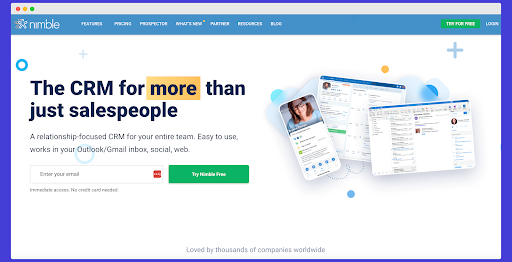
Nimble CRM is a customer relationship management tool suitable for small businesses and professionals who engage heavily with social media.
It combines contact management, email marketing, and social media insights, allowing users to track and nurture relationships across multiple platforms. Nimble excels in pulling data from social media profiles to create rich contact records, helping teams engage more effectively.
However, its reporting features and integrations are somewhat limited, which may not work for everyone.
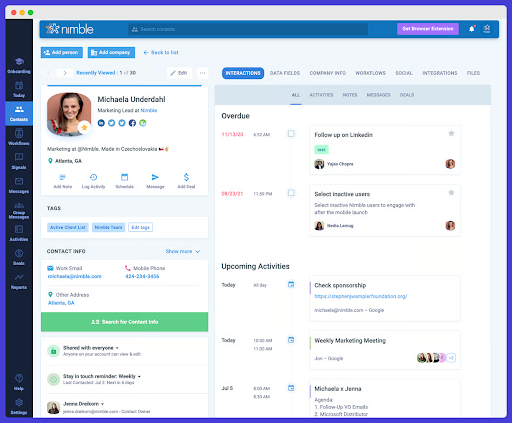
Nimble CRM key features
- Social media integration
- Automatic contact data enrichment
- Sales pipeline management
- Email tracking and templates
- Integration with Google Workspace and Office 365
- Task and calendar management
Nimble CRM pros
- Excellent social media integration for contact insights
- Automated enrichment of contact profiles saves time
- Good for managing sales pipelines and tracking leads
- Simplifies outreach across multiple platforms, like Twitter and Facebook
- Straightforward pricing plan.
Nimble CRM cons
- Limited third-party integrations outside of Google and Microsoft ecosystems G2
- Some users find the interface confusing, especially during onboarding G2
- Lacks customization options for businesses with unique workflows G2
- Learning curve can be steep for those unfamiliar with social media-focused CRMs G2
Nimble CRM pricing
Nimble has a single plan priced at $25 per user per month, with a 14-day free trial available.
Nimble offers strong social features, but the lack of advanced reporting and broader integrations might make it less appealing for businesses with more complex needs. Still, it can be a good option for small businesses looking to engage customers via social platforms.
#5 - HubSpot CRM
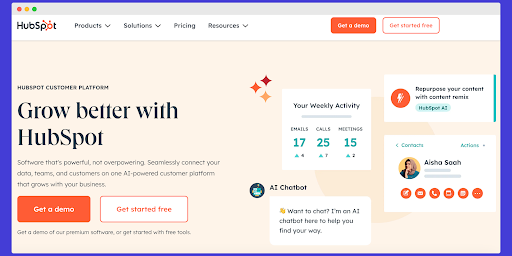
HubSpot CRM is a versatile tool designed to manage customer interactions across sales, marketing, and support.
Its appeal lies in its intuitive interface and free plan, which gives small teams access to basic CRM features and unlimited contacts. HubSpot also offers paid plans that unlock more advanced tools, but these can get expensive as your needs grow.
The CRM integrates well with Gmail, Outlook, and other popular apps, making it a good fit for businesses already using these platforms.
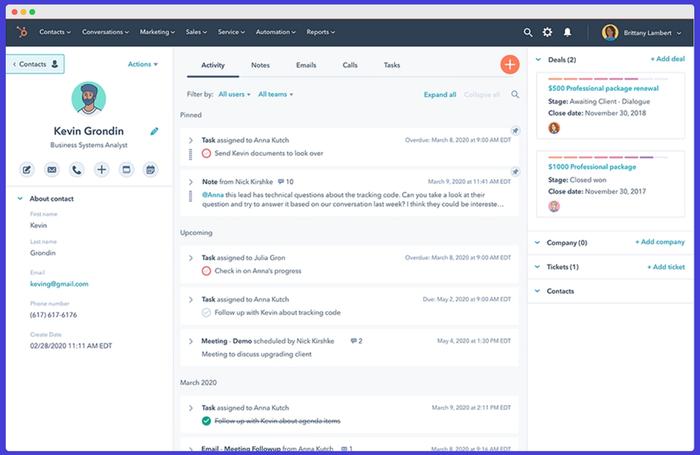
HubSpot CRM key features
- Contact management
- Sales activity tracking
- Email tracking and templates
- Meeting scheduling
- Customizable dashboards
- Reporting and analytics
- Sales pipeline management
- AI email writing tools
HubSpot CRM pros
- Strong free plan for small businesses to get started with essential tools
- Seamless integration with Google and Microsoft apps
- Provides real-time updates on sales activities
- Great for tracking email opens and clicks
- Easy to use, with a straightforward interface.
HubSpot CRM cons
- There are inevitable implementation costs on higher plans – source
- The free version lacks some key functions like automation and reporting G2
- Add-ons for extra features can make the platform expensive quickly G2
- Complex tools can require extra training G2
- Limited customization—the interface can feel rigid G2
HubSpot CRM pricing
HubSpot offers a free plan, which includes basic CRM tools like contact management, deals, tasks, and companies. Other plans cost from $20, $100, and, $150 per month and add multiple currencies, email sequences, and lead scoring, respectively.
HubSpot is a great choice for small businesses starting out with CRM tools, but for more advanced features, the pricing can escalate quickly, especially for larger small businesses.
#6 - Pipedrive CRM
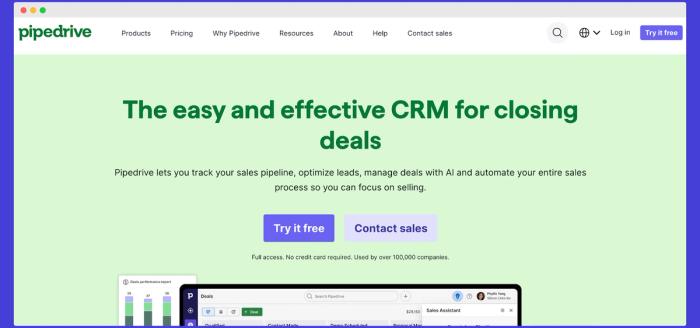
Pipedrive CRM is built to streamline sales processes, offering tools for managing pipelines, tracking deals, and automating repetitive tasks.
It’s popular for its simplicity and ease of use, especially for small to mid-sized sales teams. The platform focuses on helping teams stay organized by keeping all communication and deal tracking in one place.
Be that as it may, its limited customization and integration challenges may be problematic for businesses with more specific needs.
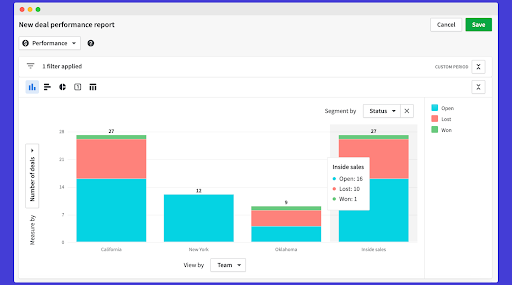
Pipedrive CRM key features
- Customizable sales pipelines
- Automated workflows
- Centralized communication hub
- Lead and deal management
- Mobile app for managing CRM on the go
Pipedrive CRM pros
- Intuitive interface that’s easy for new users to pick up
- Pipeline management is clear and customizable
- Automates sales tasks, saving time on admin work
- Real-time reporting helps track sales performance
- Affordable compared to many competitors
Pipedrive CRM cons
- Customization is limited, especially for more complex sales processes. G2
- Integration with third-party tools can be tricky. G2
- Customer support can be slow to respond. G2
- The mobile app lacks some desktop functionality. G2
- Data syncing across platforms isn’t always smooth. G2
Pipedrive CRM pricing
Pipedrive CRM pricing starts with the Essential plan at $14.90 per user per month, which covers basic sales management tools. For more advanced features like workflow automation, the Advanced plan costs $27.90 per user per month.
Teams looking for better reporting and integrations can opt for the Professional plan at $49.90 per user per month. Custom enterprise plan is $99.90 per month.
Pipedrive is a solid CRM for managing sales pipelines, but its limitations in customization and integrations may lead businesses with more specific needs to explore alternatives.
#7 - Insightly CRM
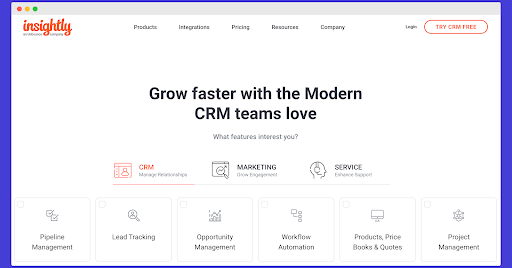
Insightly CRM is a cloud-based platform ideal for businesses that want to manage customer relationships, automate workflows, and track sales.
Best known for its project management tools, it's a reasonable choice for teams looking to manage both sales and projects in one place.
While Insightly offers powerful features like task management and lead tracking, it has some limitations in customization and contact limits.
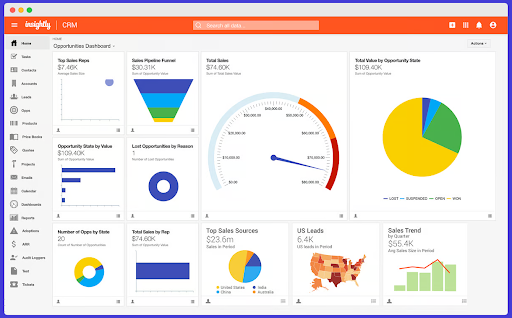
Insightly CRM key features
- Integrated project management
- Workflow automation
- Lead and opportunity management
- Customizable dashboards and reporting
- Email marketing integration
Insightly CRM pros
- Combines CRM with project management tools, offering more flexibility.
- Easy-to-use interface, making it accessible to new users.
- Workflow automation saves time by reducing manual tasks.
- Offers customizable dashboards for tracking performance.
- Integrates with popular apps like Google Workspace and Microsoft 365.
Insightly CRM cons
- Customization options, such as custom fields, are limited G2
- Integration through AppConnect can be complicated for non-technical users G2
- Customer service reviews are mixed, with some users reporting slow response times G2
- Pricing can get expensive, especially for smaller businesses. G2
Insightly CRM pricing
Insightly offers a free plan with basic features. Paid plans start at $29 per user per month and go up to $99 per user per month for the full suite of features.
Insightly is a sound CRM option for businesses that need both sales and project management, but its limitations might push some companies to explore other alternatives depending on their needs.
#8 - Simply CRM
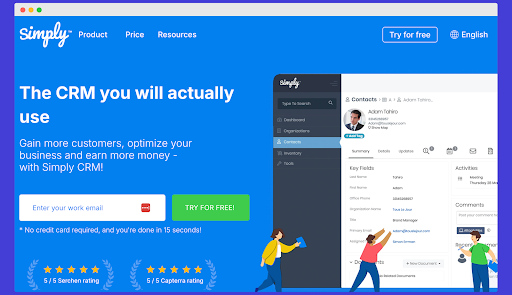
Simply is a CRM that helps businesses manage customer relationships, track sales, and organize tasks.
It consolidates customer data in one place, giving teams easier access to information and helping improve decision-making. Simply CRM also offers project management features and analytics to help teams stay on track.
However, it has some shortcomings, particularly when it comes to customization and interface performance, which may not meet the needs of all businesses.
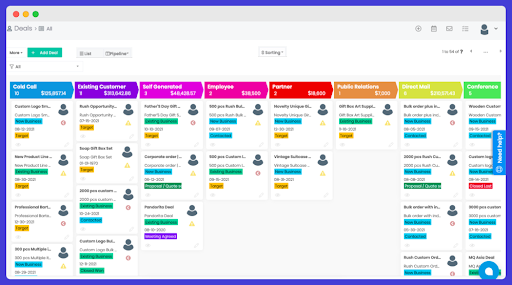
Simply CRM key features
- Integration with Google Apps, Microsoft Dynamics, and email systems
- Visual sales process with pipelines and Gantt charts
- Project management with tasks and milestones
- Support ticketing and service contracts
- Invoicing and financial integration
Simply CRM pros
- Easy integration with popular tools like Google and Microsoft apps.
- Visual sales tracking helps teams stay organized.
- Offers built-in project management, combining CRM and task handling.
Simply CRM cons
- Limited customization options may not suit businesses with specific needs G2
- The interface can be slow to load and you may encounter some bugs G2
- Users have reported connectivity issues that disrupt access to data G2
- Support delays have been noted, affecting response times for queries G2
Simply CRM pricing
Simply CRM starts at $15 per user per month, offering a free trial to test out the platform.
Simply CRM can work for businesses looking for basic CRM and project management features, but its performance and customization issues might make it less ideal for those needing more flexibility.
#9 - Less Annoying CRM
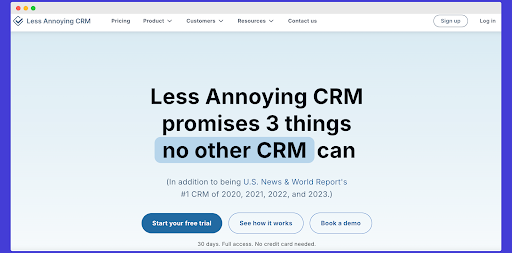
Less Annoying CRM is designed for small businesses seeking a straightforward and easy-to-use CRM solution.
It focuses on simplicity, helping users manage contacts, tasks, and sales pipelines without overwhelming them with complex features. While great for teams that need something affordable and functional, its lack of advanced features might not suit businesses looking for more comprehensive.
Less Annoying CRM key features
- Contact management
- Task and calendar tracking
- Email logging
- Mobile access
- Daily agenda summary
- Free phone and email support
Less Annoying CRM pros
- Extremely user-friendly and easy to set up
- Transparent pricing with no hidden fees
- Excellent customer support via phone and email
- Affordable at $15 per user per month
- Suitable for small businesses needing basic CRM functions.
Less Annoying CRM cons
- No built-in email client, which could be inconvenient for users relying on email communication.
- Limited customization options for reports and fields. G2
- Lacks advanced features like built-in automation and robust reporting. G2
Less Annoying CRM pricing
The pricing is simple at $15 per user per month, including unlimited contacts, pipelines, task management, and 25GB of file storage.
Less Annoying CRM is perfect for small teams that want a no-frills, affordable CRM, but businesses needing more advanced tools might want to look elsewhere.
#10 - BigContacts CRM
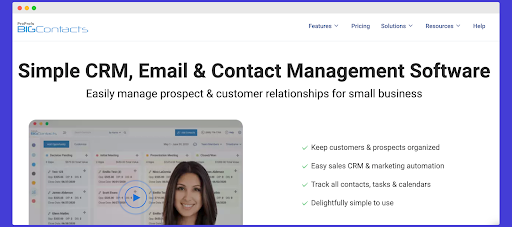
BigContacts CRM is a cloud-based tool aimed at helping small businesses keep track of their customer relationships.
Built to manage contacts, track leads, and automate tasks, it also offers basic email marketing features. The system is easy to use, making it great for teams that don’t need a lot of extra complexity.
Even so, some users may find its reporting tools and customization options a bit limited, especially compared to more advanced CRMs.
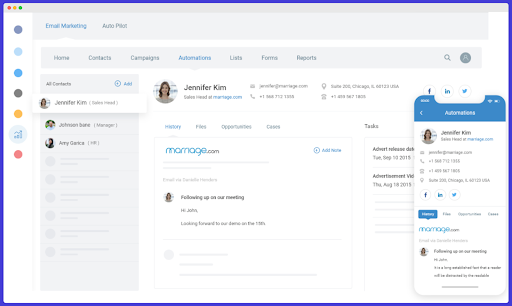
BigContacts CRM key features
- Contact management with custom fields
- Visual sales pipeline for deal tracking
- Task management with calendar integration
- Email marketing with templates and automation
- Basic reporting and analytics tools
BigContacts CRM pros
- Simple, user-friendly interface that’s easy to navigate
- Affordable pricing, starting at $9.99 per user per month
- Good email marketing options, including drip campaigns
- Integrates well with Gmail, Outlook, and QuickBooks.
BigContacts CRM cons
- Limited reporting features, which could be a drawback for data-driven teams. G2
- No dedicated mobile app, only a mobile-responsive web version.
- Some users report slow performance with large datasets. G2
- Few direct integrations with email marketing and social media software. G2
BigContacts CRM pricing
Plans start at $9.99 per user per month, making it an affordable option for small teams.
BigContacts works well for smaller businesses that need an easy-to-use CRM with basic features, but those looking for more advanced reporting or better mobile access might need something better.
#11 - Freshsales CRM by Freshworks
Freshsales CRM is a cloud-based sales and marketing platform designed to help small and growing businesses track deals and automate outreach.
With a free plan and affordable entry-level pricing, Freshsales is a solid option for teams looking for a balance of simplicity and capability.
Freshsales CRM key features
- Contact and account management
- Visual sales pipelines with drag-and-drop stages
- Built-in phone and email with tracking
- Reporting and dashboards
- Mobile CRM app for iOS and Android
Freshsales CRM pros
- Free plan available with solid basic CRM features
- Affordable entry pricing for small businesses
- Strong native communication tools (email + phone)
- AI-powered lead scoring helps prioritize high-quality prospects
Freshsales CRM cons
- Some advanced features (e.g., sequences, territory management) only in higher tiers
- Mobile app less polished than desktop version
- Reports of data export inaccuracies
- Customer support response times can be slow
Freshsales CRM pricing
- Free Plan: Basic CRM for up to 3 users
- Growth: $9/user/month (annual billing) – adds workflows and sales pipeline features
- Pro: $39/user/month – includes advanced automation and AI scoring
- Enterprise: $59/user/month – advanced customization, permissions, and dedicated support
Freshsales CRM is a cost-effective CRM alternative to Keap for smaller teams. Its free plan and competitive entry-level pricing make it a strong option for startups and SMBs.
#12 - Monday Sales CRM
Monday Sales CRM, built on the monday.com platform, connects CRM with project management to help businesses manage customer interactions.
It’s popular with teams that want a highly visual, flexible system. However, it lacks a true free CRM plan, with pricing starting at the paid tiers.
Monday Sales CRM key features
- Deal management
- Customizable sales pipelines
- Workflow automation and reminders
- Sales forecasting and reporting dashboards
- Integration with Gmail, Outlook, Slack, and more
Monday Sales CRM pros
- Highly customizable dashboards and workflows
- Combines CRM and project management in one platform
- Good collaboration features for teams
- Intuitive, visual interface easy for non-technical users
- Wide range of integrations with third-party apps
Monday Sales CRM cons
- No free CRM plan (only paid tiers)
- Key integrations missing from lower-tier plans
- Can feel overwhelming for users who just need a simple CRM
- Customer support can be slow, depending on the plan
Monday Sales CRM pricing
- Basic: $12/seat/month (billed annually, min. 3 seats)
- Standard: $17/seat/month – adds automation and integrations
- Pro: $28/seat/month – includes advanced dashboards and forecasting
- Enterprise: Custom pricing with advanced security and support
Monday Sales CRM works well for businesses that want flexibility and team collaboration in addition to CRM tools. However, the lack of a free plan and feature gating at lower tiers may make it less attractive for budget-conscious startups.
Conclusion
Is sticking with a CRM that's complicated and expensive really helping your business?
If Keap is slowing you down or frustrating your team, it might be time to rethink your options.
There are plenty of great alternatives out there, and Capsule CRM stands out for its simplicity, affordability, and ease of use.
Unlike Keap, Capsule keeps things straightforward, letting you manage contacts, sales pipelines, and tasks without feeling overwhelmed.
Why struggle with a tool that doesn’t fit when Capsule CRM can get your business running smoothly?
Try Capsule today and experience a CRM that works for you, not against you.
